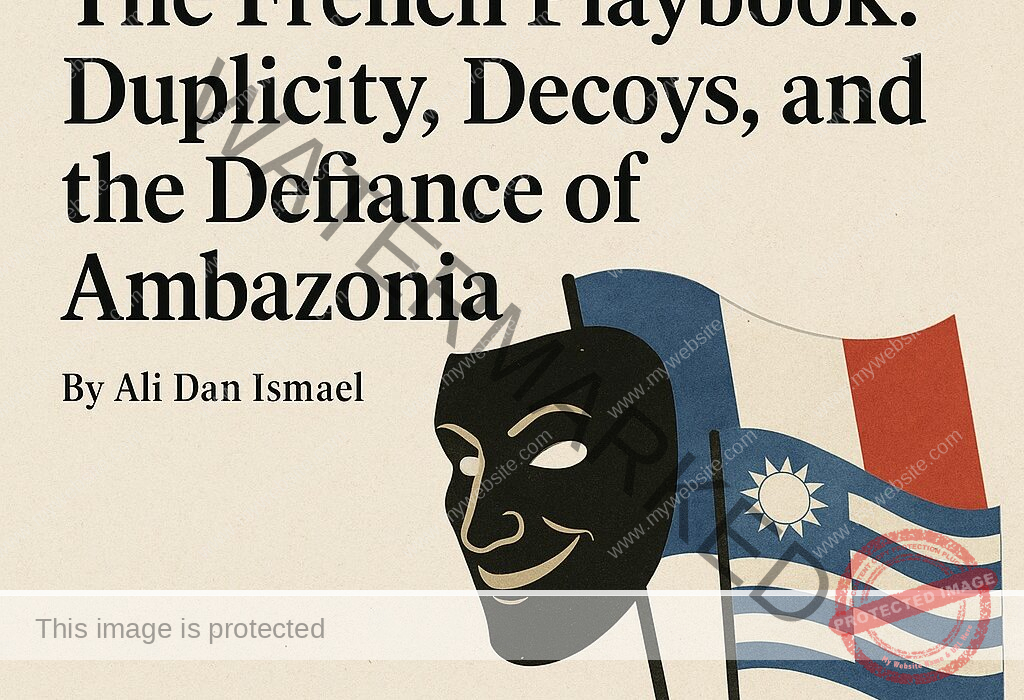By Ali Dan Ismael editor in chief
In the long and complex history of Franco-African political relations, few tactics have proven more enduring—or more strategically deceptive—than the use of duplicity. In Ambazonia, this method has taken the form of installing seemingly representative figures whose real function is to pacify international observers while undermining genuine popular aspirations for sovereignty.
The strategy is far from new. Originating in the colonial era, this French playbook has relied on elevating local personalities perceived as cooperative or moderate, often at the expense of leaders with strong grassroots support or nationalist credentials. Once again, this approach appears to be unfolding.
The latest figure positioned in this pattern is Prime Minister Joseph Dion Ngute. Although he hails from Southern Cameroons, his appointment by the Yaoundé regime and subsequent outreach efforts—including highly publicized visits to Bamenda and Buea—follow a familiar trajectory: replace genuine leadership with more pliable alternatives, use optics to suggest reconciliation, and allow structural injustices to persist unchallenged.
Yet for many Ambazonians, the pattern is unmistakable—and increasingly ineffective.
Muna over Foncha – The First Shift
Following reunification, John Ngu Foncha, a leading advocate for federalism and Anglophone autonomy, began to lose political favour. In his place, Solomon Tandeng Muna was promoted—widely seen as more accommodating to the dominant Francophone establishment.
Under Muna’s leadership, the federal structure was gradually dismantled. West Cameroon’s unique institutions were absorbed into a centralized framework, resulting in the erosion of its legal, cultural, and administrative identity.
This substitution did not reflect the people’s will. It reflected geopolitical expediency.
Achu over Fru Ndi – Neutralising Democratic Momentum
During the political liberalisation of the 1990s, John Fru Ndi and the Social Democratic Front (SDF) became the face of Anglophone political resistance. The party’s mass appeal posed a serious challenge to the ruling elite in Yaoundé.
In response, Simon Achidi Achu was appointed Prime Minister. His appointment was widely interpreted as an effort to co-opt Anglophone representation while maintaining control from the centre.
Though nominally inclusive, the move did little to reverse marginalisation. Instead, it reinforced the illusion of participation.
Dion Ngute over Dr. Sako – The Contemporary Parallel
Today, Dr. Samuel Ikome Sako stands as one of the most prominent figures in Ambazonia’s quest for self-determination. His leadership is grounded in popular legitimacy, international advocacy, and a commitment to nonviolent resistance.
In contrast, Joseph Dion Ngute—while ethnically connected to the region—has yet to take any public stand against documented abuses, including the tragedies in Ngarbuh, Muyuka, and Bali. Despite this silence, he is being promoted as a moderating force.
Supporters of dialogue must question the evidence. Has Dion Ngute ever advocated for the rights of displaced Ambazonians? Has he called for an end to military operations in civilian areas? The historical pattern suggests his role is not to resolve conflict, but to preserve the status quo.
Redefining Identity: From West Cameroon to Ambazonia
This strategy of political substitution has a geographical and semantic counterpart. Over time:
West Cameroon, once a federated state with constitutional safeguards, was renamed the Ouest Province.
Southern Cameroons, with its Anglo-Saxon institutions and legal heritage, was renamed the South Region.
The erasure of names is not accidental—it is political.
It took the clear vision of Gorji Dinka to break through this constructed ambiguity. By reasserting the name Ambazonia, he restored both identity and direction to a people whose history was being rewritten in real time.
Conclusion – A Rejected Template
France and its allies may continue to rely on familiar templates: regional figureheads, choreographed outreach, and symbolic inclusivity. But the Ambazonian people have become politically sophisticated. They recognise the pattern.
They remember Muna. They remember Achidi Achu. And they now see Dion Ngute in the same frame: not as a leader of liberation, but as a placeholder in a larger strategy of control.
This time, the tactic has been exposed. The age of decoys is over.
Ambazonia’s future will be built on truth, not substitution—on sovereignty, not symbolism.
Ali Dan Ismael

